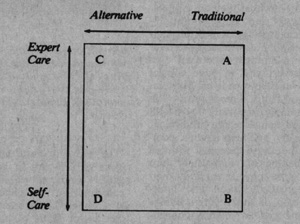One question we get asked a lot is this: "What's the difference between self-care and alternative medicine?" It's a good question.
The alternative medicine movement believes that our doctor's present tools—drugs, surgery, psychotherapy, the scientific method, and so forth—should be supplemented with tools from other healing traditions; in other words, that our doctors need to learn new skills. Others within this movement feel that we should train new kinds of health workers to practice these approaches.
For self-care advocates, the problem is that most laypeople know far too little about (1) evaluating and improving their health without waiting until they get sick and (2) coping with illness—both through self-care and by making good use of health facilities—when illness does occur. The self-care movement feels that we have depended too much on experts in health care and that with the proper training and self-study materials, laypeople would be capable of being their own paramedics, in much the same way that China's barefoot doctors function as lay paramedics.
But while self-care and alternative medicine are not identical, it is important to note that they are not antithetical. Alternative medicine proposes that our health-care system needs a new map. Self-care suggests that the wrong person has been holding the map.
We've found it helpful to plot the territory of health care in the following way. First, we can place any instance of health care along a scale with traditional medical approaches at one end and alternative approaches at the other:

We could also look at any instance of health care according to whether it is self-administered or administered by an expert:

By putting these two scales at right angles to each other, we create the following table:

We can now use this table to plot any experience of health care. For example:
1. If you go to a physician to have your sore throat examined or to have your gall bladder out, you would be making use of expert-administered traditional medical care, represented by the letter A.
2. If you learned to use a blood pressure cuff and kept track of your own blood pressure, if you started keeping a copy of your own medical record, or if you used your stethoscope to listen to your child's lungs when she had a bad cold, you would be practicing self-care using the tools of traditional medicine, letter B.
3. If you consulted a spiritual leader, a practitioner of acupuncture, or a chiropractor, you would be making use of expert-delivered alternative health care, letter C.
4. And if you started an exercise program, practiced yoga, or began meditating, you would be practicing alternative self-care, letter D.